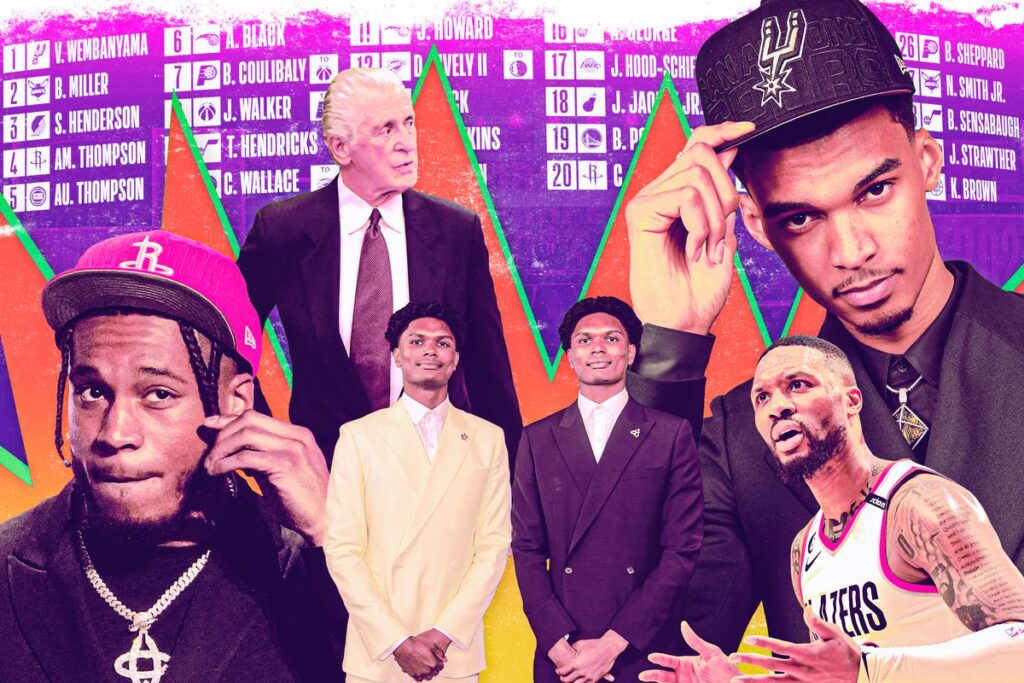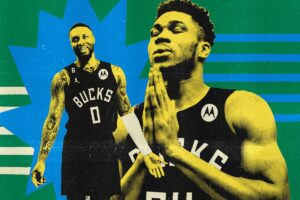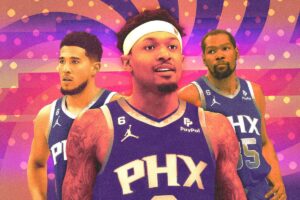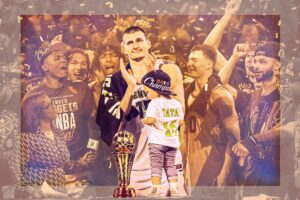Who Won and Lost the 2023 NBA Draft?
After weeks of scouting and analyzing, the 2023 draft was…pretty anticlimactic. Nonetheless, who won? And, more importantly, who lost?

For weeks, NBA teams have been doing anything but sleeping. They’ve been watching film, conducting interviews, and watching the best basketball amateurs in the world prove their worth. When the dust settled, there was a new crop of NBA talent, some trades, and confusing moves. So, who won the NBA Draft? And who lost it?
Of course, a lot is subject to change over the next few years. Prospects we think are the best thing since sliced bread will turn into Michael Olowokandi. And some unheralded European center taken in the second round will turn into Nikola Jokic. That’s the beauty of the NBA Draft for you. Regardless, I have some opinions about what went down last night.
Winner: Dallas Mavericks
I did not think I would be writing positively about the Dallas Mavericks at all this offseason. Without many assets and the unenviable position of having to give Kyrie Irving his long-term max contract, it seemed like Dallas would be staring down the barrel of a long summer. And that could still be true.
But the Mavericks were one of the big winners on draft night. After tanking their last few games to ensure they got to keep their pick, the Mavericks parlayed that into multiple good decisions that made their roster younger, cheaper, and more flexible for the future.
The first move of the night involved the 10th overall pick. Dallas traded the pick with Davis Bertans to the OKC Thunder to move back two spots. This trade gave the Mavericks a trade exception of $17 million. With the twelfth pick, Dallas selected Derek Lively II, a center from Duke.
Lively is a high-flying, rim-running, shot-blocking center who doesn’t need the ball on offense. With elite size and length (7-7 wingspan) paired with his great leaping ability, Lively has a chance to be this draft’s Walker Kessler: someone who makes an immediate defensive impact from day one. There isn’t a defensive coverage that Lively can’t handle. From switching to drop coverage, the Mavericks have found their defensive anchor of the future.
Nico Harrison and the rest of the front office weren’t done, however. While one would expect the Mavericks to hold onto their new, shiny trade exception and review their options, Dallas wasn’t so patient. In the back end of the first round, a deal was struck with the Sacramento Kings.
With Sacramento looking to unload Holmes’ big contract to free up cap space, they gave Dallas Holmes and the 24th overall pick for free. Yeah, that’s right. Sure, Holmes fell out of favor with the Kings, but he’s still a good player. And even under the new CBA rules, his contract is very affordable (2 years / $24.9 million ~ player option for the second season).
Needing some more shooting and depth on the wings, Dallas selected Olivier Maxence-Prosper. Along with probably being the best name in this draft (Scoot was a close second), Maxence-Prosper is the perfect player for a team like Dallas. Standing at 6’7″ with a 7-1 wingspan, O.M.P. can guard just about anybody on the floor.
While his offense needs some ironing out, his defense will be there from day one. If he starts shooting around 35% from three, he’s the perfect Dorian Finney-Smith replacement. He’s the type of playoff wing that every team kills for.
Now with a young quartet of Josh Green, Jaden Hardy, Lively, and Maxence-Prosper, the Mavericks don’t have to rely on big trades and signings as much. There’s room for development in-house from somebody not named Luka.
Dallas got younger and more flexible in this draft. Paying Kyrie all that money in a few weeks will suck, but this draft will make that pill go down a little easier.
Loser: Orlando Magic
Once again, thanks to the Nikola Vucevic trade, the Orlando Magic had two lottery picks. Already with a core headed by Banchero and Wagner, Orlando didn’t need to hit on these picks. They already have their two guys as they try and ramp up this rebuild. But the pieces around them, specifically in the backcourt, needed some clarifying. Instead of doing that, Orlando made a messy situation messier.
With the sixth overall selection, the Magic took Anthony Black from Arkansas. The appeal with Black is easy to see. At 6’6″, Black is another big guard, following a trend that Orlando seems to be sticking to (Suggs, Fultz, Hampton, etc.). Black is an unselfish playmaker, plays fast, and is very cerebral. With solid defense to boot, there’s only one thing holding him back.
Shooting. Like the rest of Orlando’s backcourt, all that size and upside comes without the threat of an outside shot. If Black doesn’t improve as a shooter, it’s hard for him to unlock his potential. Opponents regularly went under his screens in college. His mechanics need some work, and his touch is average at best. While I get that at his best, Black could be the type of secondary creator that is perfect next to a player like Banchero, taking another flyer on a kid who can kind of shoot is a little risky to me.
And if you thought that pick was questionable, wait until we get to the 11th selection. Orlando took Jett Howard, son of former NBA veteran Juwan Howard. While Jett is a good shooter (36.8% 3-PT in college) with good size (measured at 6’8″), his athleticism doesn’t bode well for his success in the NBA. The only thing Howard did at Michigan was score. There was almost no rebounding, playmaking, foul-drawing, or defense to speak of.
Unless the dude becomes like Duncan Robinson, a marksman from beyond the arc, what will his role be? It’s hard for such a one-sided player to be successful in the NBA. This pick felt like a reach. If the Magic wanted Howard, they likely could have traded back a few spots and added another asset. And if they really wanted shooting, why not take Gradey Dick? He was the perfect wing that Orlando should be looking to get; a pure shooter who moves well off the ball.
Nothing is stopping Anthony Black from becoming the future of this team’s backcourt. Or from Jett Howard turning into Duncan Robinson. But, as of right now, I am not a huge fan of what the Magic did on draft night.
Loser: Cam Whitmore
Cam Whitmore was one of the guys with the highest upside in the class. Ask anybody, and he had just as much allure as the Thompson twins or Anthony Black. Instead, Whitmore was the classic case of a draft day slide. In the days leading up to the trade, there were whispers and reports from numerous executives around the league that didn’t paint Whitmore very positively.
There were concerns with his health and perhaps some about his playstyle and decision-making. With a player like Whitmore, he likely only interviewed and worked out with the teams at the top of the draft order. If those teams passed on him, it was hard for teams in the mid-late lottery and the rest of the first round to gather intel on him. Of course, Whitmore’s slide ended at 20, but sitting in the green room for nearly two hours wasn’t all that pleasant.
While Whitmore isn’t a great fit on a Houston team that is as allergic to passing as he is, there’s a reason this dude was one of the highest-ranked prospects in this class. The dude can flat-out score. At 6’6″, Whitmore can shoot, drive, and handle with the best of them. He’s an explosive athlete who thrives in transition and exploits driving lanes.
If you’re the Rockets, drafting another me-first player is risky. You already have Jalen Green and Kevin Porter Jr., who fit a similar mold. We saw how ugly Houston’s playing style was last year, and Whitmore won’t exactly clean things up. But it’s hard to get a player who has the potential to average 25+ points a night sometime in his career with the 20th pick.
And even with Ime Udoka, I don’t need to tell you that Houston isn’t exactly the place to go for development. There’s a reason Victor Wembanyama was cheering that he didn’t have to go to Houston. I think Whitmore has all the tools to succeed, but it’s safe to say his draft night experience could have been a little better.
Winner: Utah Jazz
Danny Ainge and the Jazz had themselves a very busy draft night. With three selections in the first round, Utah got to start opening up their treasure trove of picks thanks to the Mitchell and Gobert trades. Multiple first-round picks is something that Jazz fans should get used to.
Danny Ainge and the Jazz had themselves a busy draft night. With three selections in the first round, Utah started opening up its treasure trove of picks thanks to the Mitchell and Gobert trades. Multiple first-round picks are something that Jazz fans should get used to.
Think of Hendricks as an upgraded version of what Kelly Olynyk was for this team last year. Head coach Will Hardy can do a lot of things with Hendricks. He can put play Hendricks in bigger lineups with Markkanen and Kessler, or he could go smaller with lineups featuring Olynyk. Hendricks should make an impact from day one, and I’m very excited to see what he brings to the table.
With the 16th pick, Utah took a gamble by selecting Baylor’s Keyonte George. George can be best described as a younger Jordan Clarkson. Clarkson is getting up there in age, and while beloved in Utah, this can best be described as his protégé.
George’s strengths are also his biggest flaws as a prospect. You can be enamored with his shot creation but be frustrated with his tunnel vision and decision-making. One kind of goes with the other. George doesn’t have great burst and doesn’t offer you a lot defensively. But his ability to create looks for himself and make tough shots is second to none. Utah is looking to add depth in the backcourt, so George makes sense in that regard. I don’t know how much of an impact he can make from day one alongside guys like Sexton and Clarkson.
And with their third and final first-rounder of the night, the Jazz selected Brice Sensabaugh from Ohio State. Sensabaugh is similar to George in a few ways. Getting buckets is the thing that he knows how to do best. He can score in a multitude of ways, is deadly shooting off the catch, and has a feathery soft touch. There’s a lot to like about Sensabaugh.
But, like George, the only way for Sensabaugh to hit his ceiling is to stay on the court. He can’t do that if he’s injured or if he can’t play defense. Brice is a little heavy on his feet and may need to lose weight to keep up with wings on the perimeter. Overall, his defensive technique needs to be polished.
If the Jazz believe they can teach Sensabaugh to defend, he should have been a lottery pick that happened to fall to the end of the first round. That’s how talented he is. In Utah, Sensabaugh will be in a spaced-out system that fits his skillset well. If Brice loses some weight and starts playing defense, he’ll be the ideal role player for the Jazz.
While there are legitimate concerns about George and Sensabaugh, both are very talented. Add in Hendricks, who was one of the best picks of the draft, and the Jazz have to feel very happy with how their draft day went. They addressed some of their needs while taking some risks that could pay huge dividends down the road.
Winner: Washington Wizards
The Washington Wizards weren’t very active on draft night. In fact, their one move, trading up for Bilal Coulibaly, wasn’t a move I liked very much. Washington held the eighth pick but traded two second-round picks to move up one spot to take Coulibaly with the 7th selection. It seemed unnecessary because I don’t think Indiana was going to take him at 7. But Washington got their guy, so who cares?
Anyway, Washington wasn’t the big winner of draft night per se, but they have been the busiest team this off-season. Michael Winger and this new front office have spent little time tearing this team down to its studs, and more moves are on the horizon. Let’s recap, shall we?
The first domino to fall was Bradley Beal. With his massive contract and a no-trade clause, it wasn’t hyperbole to call him one of the worst contracts in basketball. Originally, I didn’t like this move because the Wizards didn’t get much in return for Beal. Or so I thought.
After a few days, the full details of the picks came into fruition. And boy, it’s safe to say the Wizards got a haul for Beal;
- Six 2nd-round picks (2024, 25, 26, 27, 28 & 30)
- Four 1st-round pick swaps (2024, 2026, 2028 & 30)
Washington used one of these six second-rounders to trade up and acquire Coulibaly. Those pick swaps in 2028 and 2030 are especially valuable because the Suns will probably not be contenders. Their all-in push has an expiration date, so those picks could end up being in the top ten.
Kristaps Porzingis was the next guy to go. Washington had a three-team trade involving Boston and the Los Angeles Clippers in place, but that fell through. LA got cold feet about Brogdon’s health issues and backed out. Now, the Wizards only had until midnight of that night to get a deal done. That was the deadline for when Porzingis had to make a decision about his player option.
Winger and the Wizards knew they had to get a deal in place, otherwise Porzingis could decline his player option and potentially leave for nothing. So, Washington scrambled together another three-team trade, this time getting the Grizzlies to help facilitate everything;
Celtics Receive: Porzingis ~ 25th pick (later sent to Detroit) ~ 2024 Protected FRP from MEM via GSW
Grizzlies Receive: Marcus Smart
Wizards Receive: Tyus Jones ~ 35th pick (later traded to Chicago for a few extra second-rounders)
In the original deal with the Clippers, the return for the Wizards was Marcus Morris and the 30th overall pick. Ew. While the 35th pick is slightly worse than the 30th, Tyus Jones is much more of an asset than Morris is. Jones is on a very affordable deal, plays well, and could be part of Washington’s future. Trading the 35th pick for a few more seconds down the line is just icing on the cake.
Considering the Wizards had no leverage in these negotiations because Porzingis could just opt-out, I would say the Wizards did a good job getting a fair deal. But Washington had one more swing in them before it was all said and done.
Winger traded Chris Paul, one of the players he got from the Beal trade to the Warriors. In return, he got Jordan Poole, a top 20 protected 2030 first-rounder and a second-round pick in 2027. Considering the Warriors will (probably) not contending in 2030, it’s hard to see that pick coveying to Washington. That 2027 second-rounder could be valuable if it’s in the low 30s, which is a real possibility given the age and turmoil Golden State is currently experiencing.
Anyway, the real asset here is Poole. Washington is perhaps the best and worst place for him to go. The spotlight is dimmer, and here, he gets to take the reigns of the offense. But, going to Washington may lead Poole to lean into his tunnel vision and poor shot selection even more than he did in Golden State’s rigid system of passing and cutting. Steph Curry won’t be there to bail everything out.
Still, if you have any belief that Poole can play as he did in 2022, this is a worthwhile trade for Washington. Paul didn’t fit this new rebuilding timeline, so snagging a player like Poole, who has the potential to be a 25-ppg scorer for the next half-decade, is a worthwhile risk.
With these moves, the Wizards have gotten a lot younger and cheaper. They now have a boatload of assets for the future. I’m sure they’re not done making moves, either. If Winger doesn’t want to bring back Kyle Kuzma, I’m sure a sign-and-trade can happen. Washington has a plethora of veteran guards like Delon Wright, Monte Morris, and Will Barton, who could find homes on contenders.
After years of middling in mediocrity under Tommy Shepard, this new regime in Washington has a plan for the future, and they’re executing it. Of course, tearing a team down is much easier than building one up. There’s still a lot of work to be done, but the future is looking so much brighter in DC than it did a few weeks ago.
Who won the NBA Draft? Who lost? Leave a comment down below!
Follow My Instagram & Facebook To Never Miss a Post: @hoopnotions


